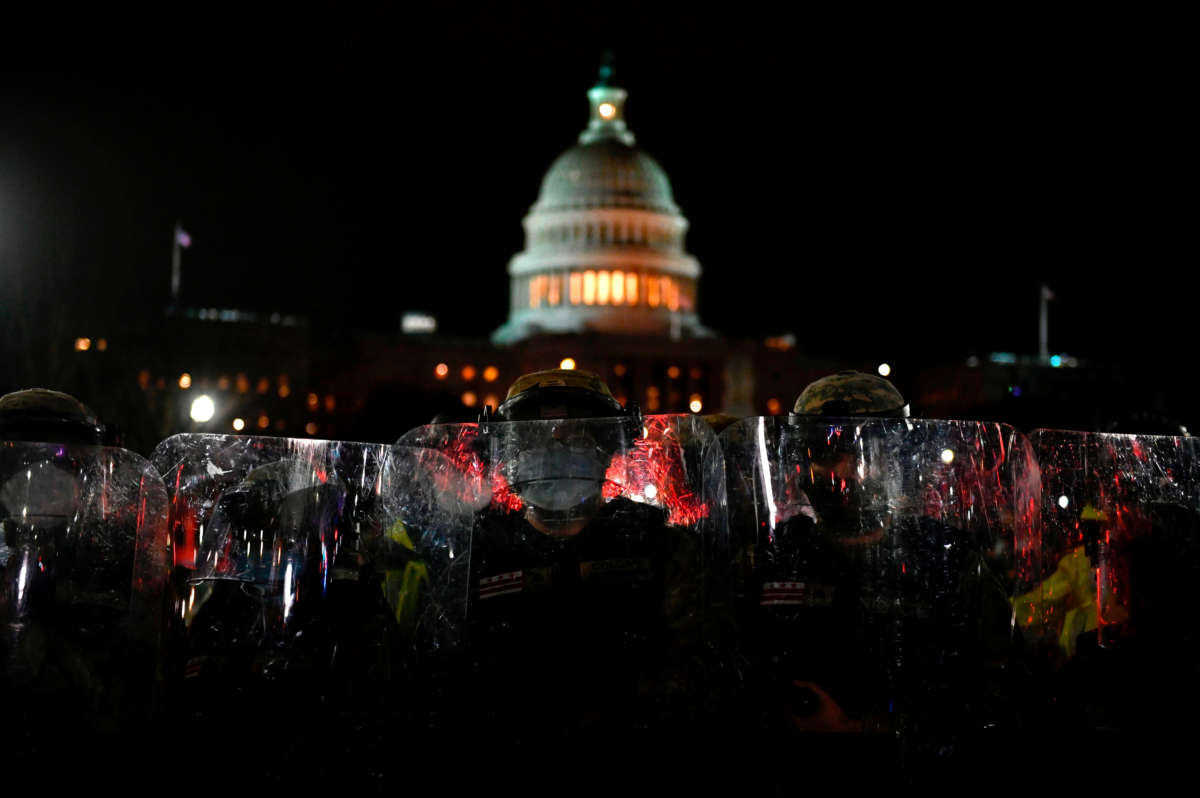Truthout is a vital news source and a living history of political struggle. If you think our work is valuable, support us with a donation of any size.
The commanding general of the District of Columbia National Guard said on Tuesday that his agency was restricted by the Pentagon from taking actions that could have allowed for a greater security presence or faster reaction time on the grounds of the U.S. Capitol building ahead of attacks that took place there on January 6 by pro-Trump loyalists.
Maj. Gen. William Walker said that leaders at the Pentagon restricted his authority to take preventive steps to address concerns about former President Donald Trump’s supporters, as the possibility for violence in Washington, D.C., became known well before the rally that took place outside the White House that day.
Local National Guard commanders usually have the ability to take responsive actions when lives are at risk or significant property damage is possible in certain scenarios, particularly when it isn’t possible to obtain approval quickly.
But Walker, speaking ahead of testimony in a House committee hearing set to take place behind closed doors, said he was restricted from being able to respond preemptively when Trump loyalists besieged the Capitol.
“All military commanders normally have immediate response authority to protect property, life, and in my case, federal functions — federal property and life. But in this instance I did not have that authority,” Walker explained in an interview with The Washington Post.
A detailed timeline of the day’s events shows that the Pentagon took about an hour and a half to approve requests for the National Guard to respond to the Capitol breach, according to reporting from The Hill.
Former Army secretary Ryan McCarthy also told The Post that the restrictions from the Pentagon were put in place due to criticism that the Department of Defense had received for the way in which they had handled Black Lives Matter protests last summer.
“After June, the authorities were pulled back up to the secretary of defense’s office. Any time we would employ troops and guardsmen in the city, you had to go through a rigorous process,” McCarthy said.
Many have noted that there were significant differences in police and military presence and actions during the Capitol breach of January 6, compared to the Black Lives Matter protests that took place over the summer, which received a significantly swifter preemptive security response. President Joe Biden has himself criticized the wide discrepancies in how each event was approached earlier this month.
“No one can tell me that if it had been a group of Black Lives Matter protestors yesterday that they wouldn’t have been treated very differently than the mob that stormed the Capitol,” Biden wrote in a tweet on January 7. “We all know that’s true — and it’s unacceptable.”
The D.C. National Guard wasn’t the only agency that didn’t prepare enough for the Capitol breach that took place on January 6, which resulted in the death of five individuals. The U.S. Capitol Police were also slow to react or even prepare for the possibility of violence on that day, according to several accounts from officers who spoke to The Associated Press earlier this month about the event.
In those same closed-door House hearings on Tuesday, Yogananda Pittman, the acting chief of the Capitol Police, acknowledged that the agency had been aware of a “strong potential for violence” that day, and apologized directly to Congress for the ill-prepared response.
“I am here to offer my sincerest apologies on behalf of the department,” Pittman, who was not in charge of Capitol Police on January 6, said.
The National Guard plans to keep 5,000 troops in Washington, D.C., through mid-March, because of the continued threats of violence that exist from far right groups and ardent Trump supporters who refuse to accept the results of November’s presidential election, based on false claims of election fraud that the former president continues to push.
Many believe Trump is to blame for having instigated his loyalists to attack the Capitol. Trump invited his most ardent supporters to descend on Washington, D.C., in several tweets prior to January 6, including in one post he made on December 20 where he said the rally he’d be hosting would be “wild.”
During the event itself, Trump continued to peddle false claims of fraud and used language that appeared to motivate his loyalists to attack the Capitol, including at one point saying to his supporters that they’d “never take back our country with weakness.”
A terrifying moment. We appeal for your support.
In the last weeks, we have witnessed an authoritarian assault on communities in Minnesota and across the nation.
The need for truthful, grassroots reporting is urgent at this cataclysmic historical moment. Yet, Trump-aligned billionaires and other allies have taken over many legacy media outlets — the culmination of a decades-long campaign to place control of the narrative into the hands of the political right.
We refuse to let Trump’s blatant propaganda machine go unchecked. Untethered to corporate ownership or advertisers, Truthout remains fearless in our reporting and our determination to use journalism as a tool for justice.
But we need your help just to fund our basic expenses. Over 80 percent of Truthout’s funding comes from small individual donations from our community of readers, and over a third of our total budget is supported by recurring monthly donors.
Truthout’s fundraiser ended last night, and we fell just short of our goal. But your support still matters immensely. Whether you can make a small monthly donation or a larger one-time gift, Truthout only works with your help.
